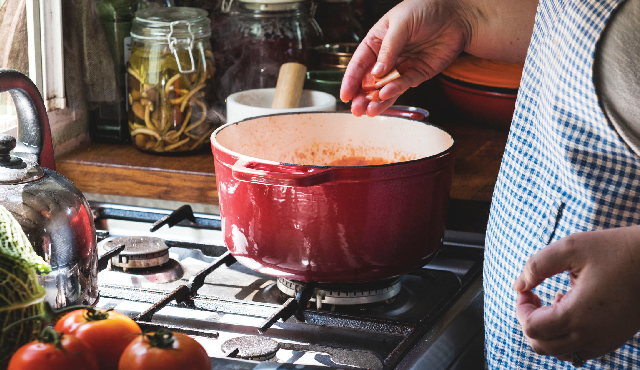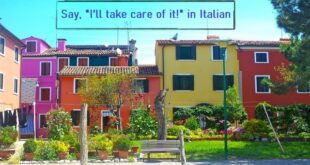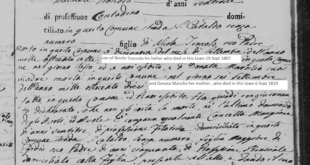“Is my eggplant parmesan soggy?” I queried my husband after a New York Times Food Section article thrust me into momentary self-doubt. “NEVER,” he reassured me.
“Solving the Puzzle of Eggplant Parmesan” (NY Times, Sept. 22, 2017) quoted the advice of several accomplished chefs — one who learned to cook at his mother’s side in her well-regarded restaurant in Lyon, France — but none of them were Italian. What’s wrong with this picture?
We Italians irrefutably know certain things about life, love and food. These lessons were taught to us in our nonnas’ kitchens, absorbed through the atmosphere of our Italian communities, or passed on as genetic memories.
The much-touted Mediterranean Diet, with its “recently discovered” boost of anti-oxidants, has always been our staple. Italian men’s low rate of prostate cancer is now attributed to the increase in lycopene when tomatoes are cooked. The rest of the world is finally discovering what we Italians have long known – our food is not only delicious but also healthful to body and soul. As a girl in the throes of adolescent angst, nothing comforted me more than a family visit to my grandparents’ home, where love was expressed through the simple act of sharing a meal, lingering for hours at the dining table.
In addition to preparing our delectable dishes, Italians grasp other crucial aspects of life. For example, we have always recognized the benefits of a mid-day nap, something recently confirmed by scientists. The descendants of my Sicilian-immigrant grandparents all take naps, even those who have never lived in a hot climate. How fortunate that my dad’s chosen profession allowed him to maintain this schedule. He would return from the high school where he taught Italian, strip down to his ribbed white undershirt and boxer shorts, and fill our apartment with the reassuring sounds of pre-dinner snoring.
In like manner, we Italians have long known the importance of physical affection. In my childhood, we rarely entered or left a home without a sustained hug from each family member. This included a hug from mother each morning as we parted for school, and one from father if he had not yet left for work. The memory of being momentarily wrapped in the security of a parent’s arms would sustain us through the school day’s challenges. At our larger family gatherings, with so many cousins, aunts, and uncles to greet, the journey from entry foyer to living room could take a half hour. When I recently read that a daily 10-second hug causes biochemical and physiological reactions that can significantly improve health, I imagined my ancestors shrugging as if to say, “What? The world is just now discovering that hugs are good for you? Allora DUH!”
Along with learning expected behavior, (eat, nap, hug, repeat), Italian children also quickly learn which behaviors are not acceptable. We have an expression, “Non si fa,” which simply means, “It is NOT done.” Disrespect for others was always a huge “Non si fa.” Criticizing a priest or a teacher was not tolerated. A sassy reply to our mother would elicit our father’s scolding, “Don’t speak to your mother like that. Non si fa!” Once when Grandma’s kitchen radio informed us that the game at nearby Yankee Stadium, where my dad and brother were in attendance, had gone into extra innings, I suggested that we start dinner without them. Grandma eyed me as if I had suggested we commit a mortal sin. Eat without all the family present? “Non si fa!”
One need not be born an Italian to embrace our daily patterns and our enjoyment of life. My husband Don advises, “If you are not Italian yourself, do the next best thing and marry one.”
After our daughter Micol gave birth to her second baby, she requested an early hospital discharge. A concerned nurse queried, “Do you have help at home?” Micol replied, “Grandma is visiting.” The interrogation continued: “Will you have to do any housework? Any meal preparation?” Three simple words, “Grandma is Italian,” garnered the nurse’s immediate cooperation. “You may go home.”
***
The above appears in the March 2020 issue of the print version of Fra Noi. Our gorgeous, monthly magazine contains a veritable feast of news and views, profiles and features, entertainment and culture. To subscribe, click here.
 Fra Noi Embrace Your Inner Italian
Fra Noi Embrace Your Inner Italian








This piece warmed my heart and was such a great reminder of the importance of family, napping, and hugging. When I had my 86 year old mother read it, she responded with, “I wish I had known the importance of hugs and physical affection when I was raising my young children.” Thanks so much to Claudia and her amazing insights! I wish I were Italian!